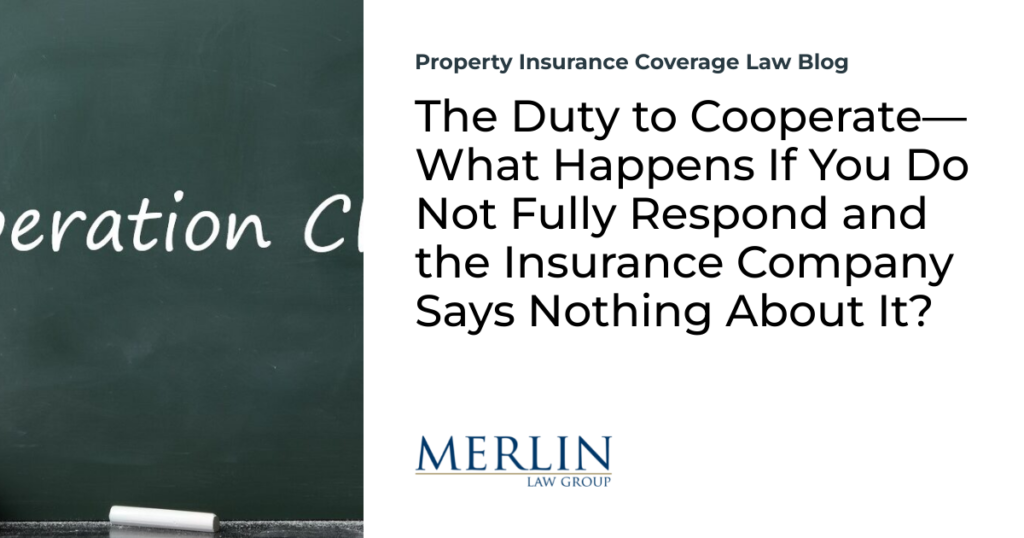The Duty to Cooperate—What Happens If You Do Not Fully Respond and the Insurance Company Says Nothing About It?

Insurance company attorneys can be tricky because they try to “set up” defenses in the investigation of a claim and then claim non-cooperation or fraud if the requests are not fully responded to. It is almost as if the insurance defense bar is playing a “gotcha” game. On the other hand, not cooperating on an obvious and material issue will spell doom for the policyholder. This was the case in a matter decided last week.1
Here are the facts as noted by the court:
This is an insurance recovery case, resulting from two fires that occurred within a period of twenty-four hours and were investigated by law enforcement as potential arson. Plaintiffs-Appellants David and Katja Streeter—the owners of the subject property—promptly made a fire loss claim with their insurer, Defendant-Appellee USAA General Indemnity Company (‘USAA GIC’). After USAA GIC issued payments in the amount of $644,328.72, the Streeters filed suit in the United States Court for the District of Montana, alleging claims for breach of contract, violations of Montana’s Unfair Trade Practices Act, and declaratory judgment, and seeking punitive damages, attorney fees, and costs. At the close of discovery, USAA GIC moved for summary judgment based on the Streeters’ failure to cooperate, and the district court ultimately entered summary judgment for USAA GIC on those grounds.
…
…the record shows that when the Streeters turned their phones over to One Source for the data pull, they presented an authorization that set parameters on the data that USAA GIC could access. After USAA GIC discovered a discrepancy between the Verizon cell phone records and the extracted data, the insurer requested an expanded scope, including an examination any and all indicators of factory resets, data hiding or similar. The Streeters authorized USAA GIC to review communications and voicemail but did not authorize USAA GIC to examine indicators of factory resets, data hidings, or the like. And before USAA GIC received additional extraction reports based on the expanded scope, the Streeters revoked the right for One Source to share any information from the data pulls with USAA GIC entirely. While the Streeters participated in interviews and provided some of the requested materials, the Streeters refused to cooperate when USAA GIC requested more information to determine whether the Streeters’ statements aligned with the evidence….
The case was based in Montana, and the federal appellate court ruled the following as Montana law regarding cooperation:
[T]he district court correctly held that an insurer prevails on a noncooperation defense under Montana law when the insurer establishes: (1) the insured failed to cooperate in a material and substantial respect, (2) with an insurer’s reasonable and material request, (3) thereby causing actual prejudice to the insurer’s ability to evaluate and investigate a claim.
The appellate court ruled for the insurer:
[T]he Streeters did not cooperate with USAA GIC’s request for additional information, which impaired USAA GIC’s ability to investigate the validity of the claim before issuing substantial payment—$644,328.72—to its insured. Accordingly, the Streeters’ failure to cooperate caused actual prejudice to USAA GIC’s ability to evaluate and investigate the claim…. the district court correctly entered summary judgment for USAA GIC, as the evidence in this case permits but one conclusion—that the Streeters failed to cooperate with USAA GIC during its investigation, prejudicing the insurer’s investigation into the set of fires giving rise to the Streeters’ claims.
The policyholders unsuccessfully argued that the issue of non-cooperation was a “red herring” manufactured by the insurance company:
The Streeters’ position is that the data issues are really a red herring, created after the fact by USAA GIC to manufacture a lack of cooperation that really never existed to begin with. USAA GIC had its own problems for deleting data from its claims file, that the Magistrate and the Article III Judge failed to address.
The insurance company successfully argued and proved to the court’s satisfaction that it asked for cooperation, the policyholders stopped cooperating, and the materials finally obtained after litigation was commenced showed that there was a material failure to cooperate:
Streeters did not cooperate fully with this request—Streeters authorized USAA GIC to review communications from the week of July 8, 2019, to July 15, 2019, and voicemail only. Streeters did not authorize USAA GIC to examine for indicators of factory resets, data hiding, or similar, as requested. Then, in an email to USAA GIC on August 26, 2019, Mr. Streeter stated he was suspending the right for OneSource to share any further information from the data pulls with USAA GIC. Mr. Streeter testified that he revoked all authorizations at this point. Streeters did not authorize USAA GIC to access the data again prior to this lawsuit. Streeters’ conduct constitutes a failure to cooperate and failure to provide access to records and documents, which violates the Policy.
The bottom-line lesson is to provide the insurance company with all reasonable requests for information as soon as possible. If there is any issue, ask about the issue rather than refuse to provide the requested information. As a safety measure, then ask if the insurance company has all it needs and if anything asked for was not provided. Often, the insurers are using boilerplate requests and will modify those to fit the situation. Cooperation is a two-way street, as I noted long ago in Cooperation Clause Does Not Require the Policyholder’s Slavish Obedience.
Thought For The Day
Coming together is a beginning, staying together is progress, and working together is success.
—Henry Ford
1 Streeter v. USAA General Indemnity Co., No. 23-35086 (11th Cir. Dec. 6, 2023).







